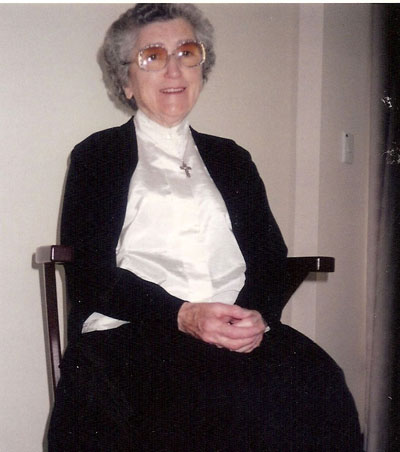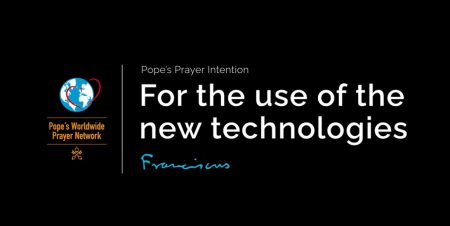Sr. Maris Stella Conlon – Eulogy

As we gather here today in Subiaco, in the Villa Chapel, a place so very familiar to Maris Stella, I would like to acknowledge the many people, present and not present, who have been part of Maris Stella’s life – the people who have blessed her life in various ways and the people whose lives have been blessed through encountering her. I would particularly like to make special mention of Maris Stella’s family members in Ireland who are with us in spirit at this time & with whom she retained a very close bond down through the years irrespective of where her ministry took her.
If you had never met Maris Stella and I described her to you as
· A petite lady
· With fine features
· Who was noticeably refined in her way of speaking
· And who really enjoyed reading
you would not automatically begin to conjure up an image of somebody who would have the necessary assumed physical attributes or toughness of character to take on work in the outback of Australia; the complexity of life in Pakistan; or the day-to-day repetitiveness and sometimes heavy work with disabled people as she did in the West of Ireland.
In a brief reference to Saint Therese of Lieseux during the week, Fr. Turner made note of the fact that the sweet, benign image, with the perfect complexion, and the floral arrangement correctly positioned that we have grown accustomed to of Saint Therese in so many holy pictures, has done little to reflect the true person she was with strong characteristics, you might say she was no wilting violet. The same could be said of Maris Stella.
Behind the refined exterior was a woman
· Of great faith
· With a can-do attitude to life
· Ever ready for a new challenge
· Open to whatever and wherever God called her
Tomas Merton said there is only one thing necessary: to be what God wants us to be. In responding to who and what God wanted her to be Maris Stella’s commitment took her across different continents, to serve people of very different cultures with different needs.
Pope John XXIII said, Consult not your fears, but your hopes and your dreams. Think not about your frustrations, but about your unfulfilled potential. This quote of was not about foolhardy actions, but about taking responsibility for our hopes, dreams and actions and about refusing to be paralysed by fears when there is a need to support others and to move courageously into unknown territory. It would seem that Maris Stella took these words to heart over the years with respect to her ministry.
Maris didn’t have to wait to hear the call of the Second Vatican Council to the Church and religious in particular, to move to ministry on the margins, the call to engage with and support the people considered most in need that is the materially poor. For example in 1964 Maris Stella was already involved in Infant Health in the Kimberley. At that time she had experience of working at the Native Hospital in Derby and realised that she was well positioned to help minimise the high admission rate of Aboriginal babies to hospital through education of the mothers and home care. She remained in the Kimberley for many years. After which followed ministry experience, as already mentioned, in Ireland with young people with disabilities.
Ever open to new horizons one can easily imagine how excited Maris Stella must have been when she heard we had opened a new foundation in Pakistan in the 1980’s. It is quite likely that her response would have been, ‘well now isn’t that wonderful’ God obviously wants us to do some new work in Pakistan’ and so she set her sights on Pakistan.
But it would be misleading to think that she only engaged at the cutting edge with respect to her various ministries. As somewhat of a contrast she continues to be very fondly remembered in Medical Records here in the St John of God Hospital Subiaco, where she provided assistance and obviously cultivated strong and valued friendships with the staff. A lovely photo of her in Medical Records is a testament to how much she was treasured and no doubt will continue to be fondly remembered.
While her various ministries testify to the fact that Maris Stella was a woman who enjoyed being fully immersed in ministry, she was without doubt above all a woman of prayer, she was faithful to prayer and fearless in her faith conviction. At her request I visited her family during my last visit to Ireland. That was the first time I heard the story of her nephews’ experience with cancer some thirty or so years ago, and of Maris Stella’s role in taking him to Lourdes when his chances of even surviving the trip could not be assured. When I returned to Australia I asked her to retell me the details of how she managed expressing my amazement at the outcome, she matter-of-factly responded by saying well I was convinced that Our Lady of Lourdes would cure him and she did.
She went on to say what wonderful work her nephew has done and continues to do for other people who are sick or in need and who go on pilgrimages to Knock and to Lourdes in particular. Understandably, this event in the history of the family is very memorable and is never recalled without reference to the strong faith and where there is a will there is a way attitude of Maris Stella.
We know that Maris read widely and kept herself up-to-date with what was happening in the Church and in wider world – as evidenced by her informed opinions and contributions to conversations and community discussions.
As the years moved on for her Maris Stella graciously adjusted to a less active and more contemplative way of being. She knew so well that living her vows with depth required stillness and the ability to see each moment as it is, as an encounter with the mystery of God.
There is no doubt that Maris Stella lived by the conviction that if we are fully present to each encounter we have with others irrespective of creed or cultural differences and we respond wholeheartedly, people will experience the face of Jesus. Simple as that!
In the movie, The Agony and the Ecstasy, Pope Julius II eager to have the ceiling of the Sistine Chapel completed, repeatedly asks Michelangelo, ‘When will you make an end?’ to which the artist responds, ‘When I am finished.’ Well, Maris Stella has wend her way through life, which has involved her in creative responses to the needs of people wherever the Lord led her. She has also experienced the Church of pre and post Vatican II and has lived into all the ensuing changes and questions about an uncertain future. Like the artist Michelangelo, Maris Stella’s work is now finished. Her purpose for being is now fulfilled as indeed are the words of Thomas Merton which I quoted at the beginning ‘she has become what God wanted her to be, which is the only one thing that is necessary’.
Delivered by Sr. Pauline O’Connor, Province Leader








